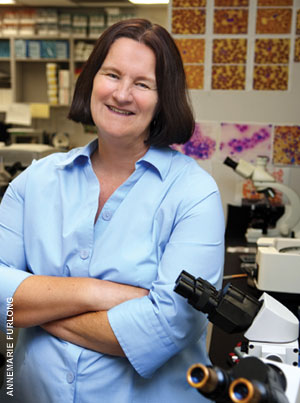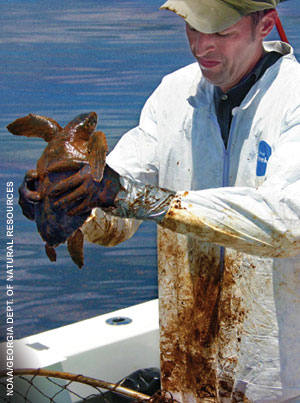 |
| Carolyn Cray, Ph.D., leads the lab team that analyzed blood samples from oil-slicked turtles. |
Wildlife experts who rescued oil-slicked turtles from the Gulf of Mexico after the Deepwater Horizon explosion sought help at what may seem an unlikely venue for sick reptiles: The Miller School’s Division of Comparative Pathology.
But it’s odd only to those unfamiliar with the medical school’s Avian and Wildlife Laboratory. Headed by Carolyn Cray, Ph.D., professor of clinical pathology, and microbiology and immunology, the lab team analyzed more than 900 samples of turtle blood, mostly from endangered Kemp’s ridleys.
“The morphological changes in their cells were dramatic,” Cray remembers of the tiny blood samples that began arriving a month after the April 20, 2010 explosion. “We had never seen anything like this.’’
Coming from a pioneer in wildlife and exotic animal pathology, that says a lot. Over the past 20 years, Cray has developed a number of tests to diagnose animal diseases veterinarians could only guess about. She owes her specialty, in part, to the cockatiel she adopted while pursuing her doctorate at UM—and her frustration over being told there were no tests to pinpoint her pet’s ailments.
 |
| Brian Stacy, a veterinarian with the National
Oceanic and Atmospheric Administration,
rescues a Kemp’s ridley turtle. |
One reason: Automated machines that quickly count the red blood cells of mammals do not identify the nucleated blood cells of birds and reptiles correctly, so they must be counted by hand. And the tiny samples from birds and other exotic pets are not easily analyzed on equipment engineered for larger animals and humans. As such, few researchers and labs undertook the task.
But Cray had the right skills and interest and landed in the perfect place with the ideal mentor to fill the niche: the division that Norman Altman, V.M.D., founded in 1981 and still directs to support investigators who study animal models of human diseases to determine their causes, progression, and treatment.
Today, Cray’s team annually evaluates more than 15,000 bird and other wildlife samples sent by zoos, aquariums, and rehab programs, earning revenue that helps support the research needs of UM investigators who are intent on conquering heart failure, diabetes, and other human diseases—and wildlife experts who have returned dozens of still endangered, but healthy, turtles to the sea. |


